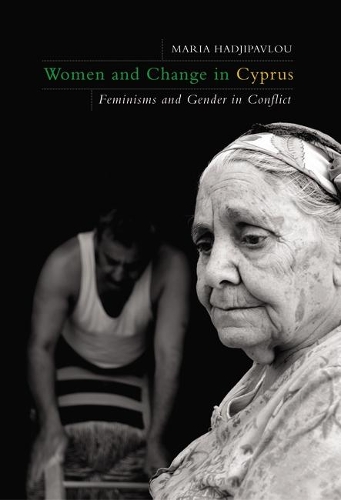
Women and Change in Cyprus: Feminisms and Gender in Conflict
(Hardback)
Publishing Details
Women and Change in Cyprus: Feminisms and Gender in Conflict
By (Author) Maria Hadjipavlou
Bloomsbury Publishing PLC
I.B. Tauris
5th May 2010
United Kingdom
Classifications
Tertiary Education
Non Fiction
Feminism and feminist theory
305.42095693
Physical Properties
Hardback
296
Width 138mm, Height 216mm
Description
Following its entry into the EU in 2004, Cyprus has become a major migrant destination. The influx of migrant workers has introduced a more complex ethnic dynamic into a country traditionally considered in light of its history of conflict between its Greek and Turkish ethnic nationals. Maria Hadjipavlou argues that the focus on Cyprus' 'national problem' has long prevented Cypriot women to challenge Cyprus' largely patriarchal and militaristic order to pursue women's rights and public visibility. While many Cypriot women are now 'liberated' from the home, this is often due to female migrant domestic workers - in effect reproducing patriarchal practices. Hadjipavlou here examines the experiences of women from Greek, Turkish, Armenian, Maronite and Latin communities and migrant domestic workers in the context of ethno-national conflict, ethnic divisions, nationalism and militarism, and argues for a multi-communal feminist movement in Cyprus to better promote women's rights.
Reviews
'The major contribution of this book is that it explores the gendered nature of the national problem in Cyprus and both the contribution that women can make as well as the effects that the hegemony of particular versions of the Cyprus problem have hadon women's position in Cyprus. [T]he book challenges the idea that the Cyprus problem is one between Greek and Turkish Cypriots and thus the common view that Cyprus is a bi-communal society. Indeed Cyprus has always included a number of ethnicities and has developed into a multi-ethnic and diverse society (something that many dominant paradigms fail to acknowledge).' - Floya Anthias, Professor of Sociology and Social Justice, Roehampton University; 'Cyprus and its conflict cannot be fully understood without recognition of the gender power structure and identity system as it intersects with those of class and ethnicity - Cyprus has long been fixated on 'the Cyprus problem' and that problem has been defined as having a single dimension: the relation between political entities, territories and peoples termed Greek Cypriot and Turkish Cypriot. The importance of Maria Hadjipavlou's book is that she transcends this dualism - It is going to be a very valuable additionto the feminist canon within the body of Cypriot sociology, anthropology and political science.' - Cynthia Cockburn, Visiting Professor, Departmentof Sociology, City University, London
Author Bio
Maria Hadjipavlou is assistant professor in the Department of Social and Political Sciences, University of Cyprus. Her research interests include the Cyprus conflict, international conflict resolution, reconciliation in divided societies, gender and conflict, and feminist theory.
